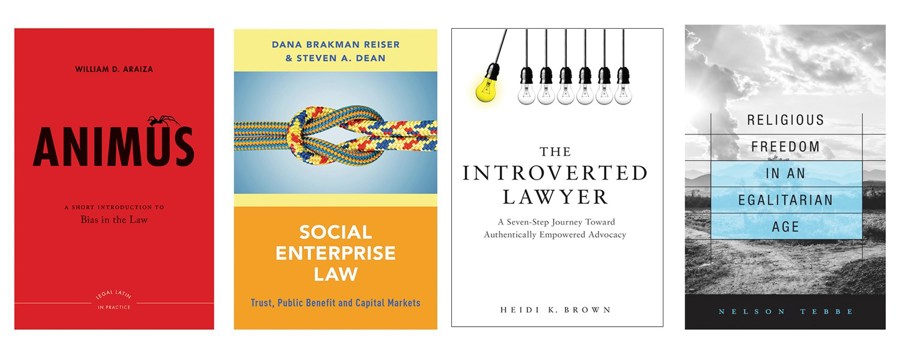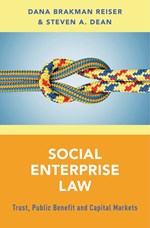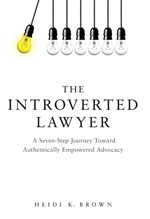
Recent Books by Professors Araiza, Brakman Reiser, Dean, Brown, and Tebbe
Brooklyn Law School faculty are nationally recognized not only for their superb teaching but also for their innovative and award-winning scholarship that has a significant impact on the law and policy. They are prolific scholars who publish influential books and articles that appear in the country’s top law reviews. Following are highlights from recent faculty books. To learn more about their work, visit brooklaw.edu/faculty.


Animus, A Short Introduction to Bias in the Law
(NYU Press, 2017)
by Professor William D. Araiza
In his latest book, constitutional law professor William D. Araiza explores an important and under-theorized area of constitutional law—the concept of animus. The idea goes like this: If a town council denies a zoning permit for a group home for intellectually disabled persons because residents don’t want “those kinds of people” in the neighborhood, the town’s decision is motivated by the public’s dislike of a particular group. Constitutional law calls this rationale “animus.” Using the Supreme Court’s most important discrimination cases through the lens of animus, Araiza traces the concept from nineteenth century legal doctrine to today’s landmark cases, including Obergefell vs. Hodges and United States v. Windsor, both related to the legal rights of same-sex couples, illustrating what constitutes animus, and why the prohibition against it matters more today than ever in our pluralistic society.


Social Enterprise Law: Trust, Public Benefit and Capital Markets
(Oxford University Press, 2017)
by Professor Dana Brakman Reiser and Vice Dean Steven A. Dean
Here’s the controversial concept set forth in Professor Dana Brakman Reiser and Vice Dean and Professor Steven Dean’s newest book on social enterprise: law can make corporations better citizens and make it easier for start-ups to raise capital by preventing insiders from selling out a social mission for increased profit. In Social Enterprise Law: Trust, Public Benefit and Capital Markets, their first book together, they explore the potential impact of new crowdfunding rules and increasingly popular hybrid legal forms such as the benefit corporation on the ability of start-ups to raise capital. Brakman Reiser and Dean advocate for creating a stable balance between financial returns and public benefits, which will allow social entrepreneurs to team up with impact investors that share their vision of a double bottom line. They demonstrate how a social mission can even be shielded from the turbulence of an acquisition or bankruptcy. Their comprehensive book explores how legal institutions across the globe could be reformed.


The Introverted Lawyer: A Seven-Step Journey Toward Authentically Empowered Advocacy
(Ankerwycke Books, 2017)
by Professor Heidi K. Brown
Associate Professor of Law and Director of Legal Writing Heidi K. Brown champions the important skills of quiet lawyers in a field dominated by extroverts. This book highlights the valuable gifts of introverted and socially anxious legal professionals, such as empathy, impactful writing, creative problem-solving, and active listening. The second half of the book is dedicated to helping quiet law students and lawyers become more powerful advocates without rejecting their authentic personalities. Brown uses a holistic approach to help introverted and shy students and legal professionals stake their claim in the legal industry and make the case for compassionate collaboration and self-awareness in a world that often prioritizes extroversion and rapid-fire communication.


Religious Freedom in an Egalitarian Age
(Harvard University Press, 2017)
by Professor Nelson Tebbe
When a bakery refuses to prepare a cake for a gay couple’s wedding, how does that square with the Constitution? As lawmakers work to protect LGBT citizens and women seeking reproductive freedom, religious traditionalists assert their right to dissent from what they see as a new liberal orthodoxy, and tensions between religious freedom and equality law are newly strained in America. In his new book, Professor Nelson Tebbe, who teaches courses on constitutional law, religious freedom, legal theory, and professional responsibility, explores this heightened polarity. Tebbe advances a method called social coherence, based on the way that people reason through moral problems in everyday life. Social coherence provides a way to reach justified conclusions in constitutional law, even in situations that pit multiple values against each other.